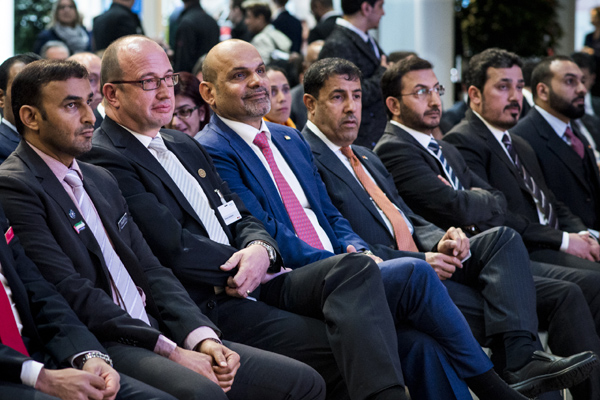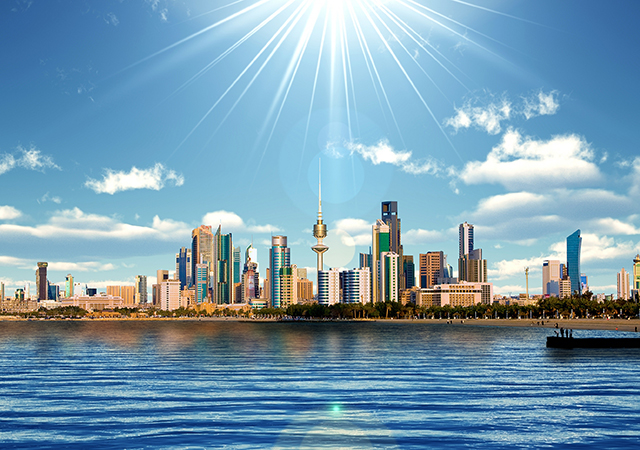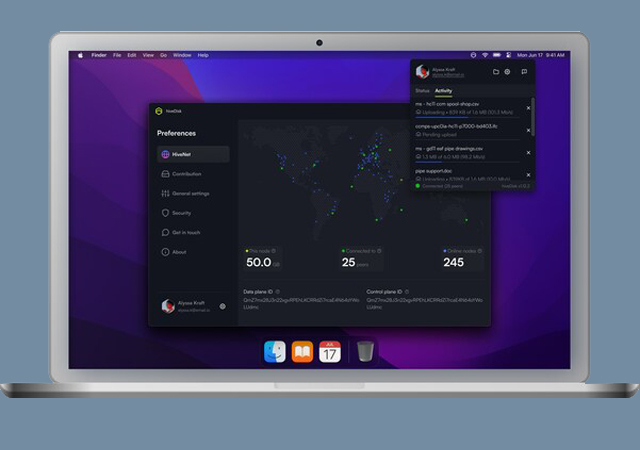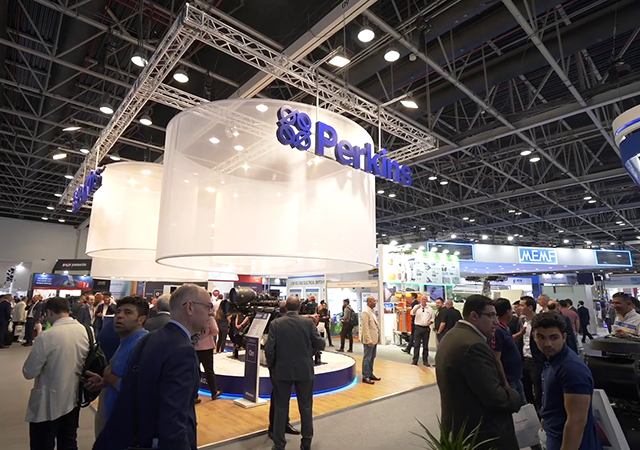 UAE delegates at the forum
UAE delegates at the forum
Abu Dhabi Ports has announced that its Khalifa Port Free Trade Zone will open to European markets, revealing details to an international audience during the sixth annual UAE Business and Investment Forum at Hannover Messe, Germany.
Mana Mohammed Saeed Al Mulla, CEO of Khalifa Industrial Zone (Kizad), noted that the new free trade zone, which boosted the total size of Kizad free trade space to more than 100 million sq m, has received 130 international and local investors since opening in 2016.
The Business and Investment Forum is a key annual event for raising awareness about foreign direct investment (FDI) opportunities available to international stakeholders and conducting business-to-business and business-to-government meetings.
Across keynote speeches and three panel discussions, high-level officials and representatives from leading Emirati manufacturers and industry organisations discussed the country’s transition to a post-oil economy, innovation and technological applications throughout the UAE, and the national readiness for international investments.
In particular, government officials highlighted the vital role of SMEs to the UAE, describing them as the “backbone” of the economy, as well as noting the strength of German-Emirati trade relations and ongoing direct investments.
Speaking to an audience of international stakeholders and investors, Abdullah Al Saleh, undersecretary of the Ministry of Economy, said: “Collectively, small- and medium-sized enterprises form the backbone of our national economy. SMEs account for over 60 per cent of the UAE’s GDP, so we are committed to facilitating their sustained and comprehensive growth – especially those that are directly involved in industrial production.”
Also introducing the event was Ali Majed Al Mansoori, chairman of the Department of Economic Development – Abu Dhabi, who spoke of the emirate’s focus on the Fourth Industrial Revolution (4IR).
“This year, we have chosen to highlight the UAE’s contribution to the Fourth Industrial Revolution. It is our aim to drive this revolution and lead the efforts to advance these strategic initiatives into a global movement. Last year, the UAE launched a six-pronged operational programme, representing the first national policy to adopt technologies in support of 4IR,” Al Mansoori said.
Ali Abdullah Al Ahmed, the UAE Ambassador to Germany, spoke of the strong business and financial relations between the two countries. Al Ahmed noted that the UAE is Germany’s largest trade partner in the Middle East and North Africa region with bilateral trade that amounted to 15.52 billion Euros in 2015, which is equivalent to 30 per cent of the total trade with the region.
Beyond Oil
The ‘Beyond Oil’ session featured Ahmed Al Haidhani, director of industrial development at the Industrial Development Bureau Abu Dhabi; Abdul Aziz Bawazeer, acting executive director of zones operations sector at ZonesCorp; Abdulkareem Al-Masabi, executive vice president, Abu Dhabi Ports; and Saleh Muqattash, CEO of Jopetwil Industrial Co.
As well as presenting updates on the country’s economic diversification agenda, discussions demonstrated the UAE’s role as an industrial hub and provided industrial outlooks for international investors.
Ahmed Al Haidhani briefed on the Industrial Development Bureau, which oversees initiatives and programmes to create an attractive environment for investors, as well as supporting the private sector to develop local industries. He highlighted a 7 per cent increase throughout 2016 in exports from the manufacturing sector, noting the bureau’s role in catering the Emirate’s strengths in both upstream and downstream industrial services.
Al Haidhani went on to highlight that the value of FDI into the manufacturing sector totalled Dh38 billion, and explained the advantages afforded to international businesses in operating from Abu Dhabi, such as customs exemptions on material imports.
Innovation and technology
An innovation and technology panel followed, with discussion from Faisal Al Hmoudi, director of the Department of Economic Development’s Takamul programme; Dietmar Siersdorfer, CEO of Siemens Middle East; Ismail Ali Abdulla, vice president of Aerospace & Engineering Services at Mubadala Development Company and deputy chief executive officer at Strata Manufacturing; and Abdulaziz Al Obaidli, general manager of Masdar’s Shams Power Plant.
Al Hmoudi spoke of the work being done to support SMEs, inventors and innovators across the UAE, outlining the Takamul programme’s role in supporting the development of technological innovations. Takamul provides end-to-end support across the entire innovation cycle - from inception to commercial implementation.
Siersdofer said: “Digitalised industry will drive sustainable economic growth in the Middle East, and co-creation and partnerships are key. We believe the region has the potential to become a leader in Industrie 4.0, and we will continue to build local partnerships to support this exciting transition”.
Siemens announced last month at the inaugural Global Manufacturing Industry Summit in Abu Dhabi that it will donate 100 million Euros of in-kind grants to five universities in the UAE. The grants provide students with unique access to specialised software and analytics tools, in line with the global tech giant’s goals of contributing to knowledge transfer and local capacity building in the UAE.
Strata’s Ismail Ali Abdulla discussed its factory of the future, Strata 2.0, the company’s recently-announced plans for a second factory that will double its capacity and add around 60,000 sq m to its production facilities. The new factory, which will manufacture complex aerostructure components for Boeing and Airbus, will work to revolutionise traditional production methods, Abdulla explained to international stakeholders.
Investment-ready UAE
The concluding session on the UAE as an investment-ready venue for international business and investors included panellists James Bernard, director of business development at DMCC; Mustafa Khdair, acting vice president commercial of Kizad; Abdulaziz Ahmed Al Hammadi, manager of marketing and corporate communications at Dafza; and Dr Dalia Abu Samra-Rohte, deputy CEO of the German-Emirati Joint Council for Industry and Commerce.
Bernard spoke of the rapid growth taking place in the UAE’s world-renowned free zone sector, noting that DMCC is registering over 150 new companies every month. “Last year we registered 2016 new companies and this year have a similar target. We don’t see any decrease in demand and can only see an increase in the attractiveness of the UAE to investors from all over the world. Our aim is to raise the number and quality of companies joining in 2017 and increase the total number of member companies to well over 15,000 by the end of this year,” he said.
Al Hammadi said: ““Dafza is strategically positioned in Dubai as among the most attractive destination for FDI. It offers a distinct business experience for investors, making it easier for them to achieve their objectives and boost their contribution to the UAE’s GDP. Dafza remains fully committed to maintain an environment supported by advanced infrastructure, investment incentives, smart services and innovative solutions to attract top-notch German labels to join an extensive range of top value brands from all over the world. The UAE is among the most promising economies for FDIs in the world, having been ranked 8th on the 2016 UNCTAD report and selected as one of the top 15 global investment destinations. This is mainly attributable to the many investment opportunities and high growth opportunities that the country offers which comes in line with the aspirations of German businessmen and investors to build a stronger presence in the main growth markets across the Menasa region.” – TradeArabia News Service









